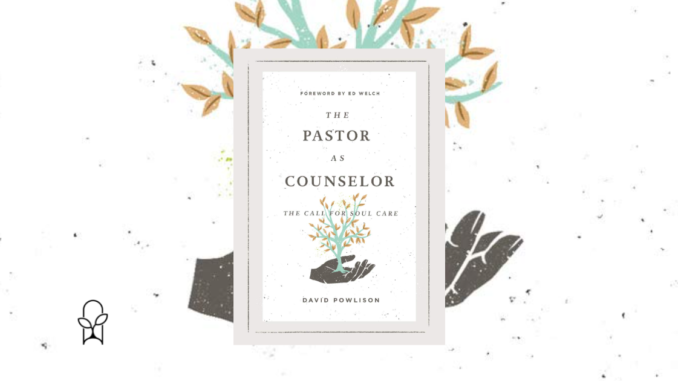
Published by Crossway Books on June 1, 2021
Genres: Non-Fiction, Christian Life, Leadership
Buy on Amazon
Goodreads

David Powlison Examines the Unique Role of the Pastor as Counselor
A pastor inhabits multiple roles--teacher, preacher, youth leader, and counselor. Yet many church leaders feel unprepared to counsel church members who are struggling with difficult, multifaceted problems.
David Powlison reminds pastors of their unique role as the shepherds of God's people, equipping them to apply biblical wisdom to the thoughts, values, moods, expectations, and decisions of those under their care.
This brief book posthumously publishes new reflections from David Powlison about pastoral counseling. The book opens with a foreword from Ed Welch, who writes about his personal connection with the author and the ways that this book has sharpened his thinking, and the main text includes an introduction, two chapters, and an appendix with suggested reading from both Christian and secular sources. Although The Pastor as Counselor: The Call for Soul Care is under eighty pages long, it is full of articulate, biblical, and concise reflections about what counseling is and why pastoral counseling is so uniquely powerful.
Insightful and Wise
Although I read this book from a layperson’s perspective, I found it insightful and helpful. Powlison explains that pastors are always counselors, regardless whether or not they meet one-on-one with people, and show by example what kind of soul care they think is necessary for flourishing. He encourages pastors to take stock of how they present themselves and what common failings they need to avoid, such as offering platitudes or not listening well. He also delineates the clear differences between pastoral counseling and secular “therapeutic professionalism.” He explains that because pastoral counseling is gospel-based and flows out of a personal relationship that is free from clinical detachment or professional reserve, it can be particularly powerful to help change people’s lives.
One Concern
I absolutely agree with this, but unfortunately, Powlison creates a false dichotomy between biblical counseling and professional therapy, making it sound like all resources outside of the church will be unhelpful and spiritually destructive. The church has unique resources to meet sufferers’ needs, and we shouldn’t abandon Christians to the spiritually twisted and harmful ideas common within secular counseling, but Powlison creates a false dilemma between abandoning people to godless counseling versus taking on all of their care within the church directly. He does not address how Christian mental health professionals can support the church’s work in complicated cases, and does not indicate what a pastor should do if someone’s mental health situation or life struggles are beyond the church’s understanding or ability to deal with.
Because I am not very familiar with Powlisons’s work, I do not know what all of his views are related to integrative approaches to counseling, and it is possible that he has addressed my concerns about this issue in-depth elsewhere. I certainly did not expect him to cover it in much detail in this very short book, but the oversimplification that he presents calls for discernment and additional reading. I hope that Powlison’s writing here will not make pastors resistant to partnering with professionals outside of the church body, as long as those therapists bring a Christian worldview and gospel implications into each aspect of their work.
Conclusion
Despite my concerns about this oversimplified element, I would strongly recommend that pastors read this book as a way to evaluate themselves, better understand their unique role in people’s lives, and consider how they can better care for others in their context. Powlison addresses many issues very well in this book, and The Pastor as Counselor: The Call for Soul Care is a wonderful resource for pastors who need succinct, encouraging insight into how they can better understand the counseling aspect of their pastoral role and engage in meaningful conversations, caring relationships, and one-on-one care.
